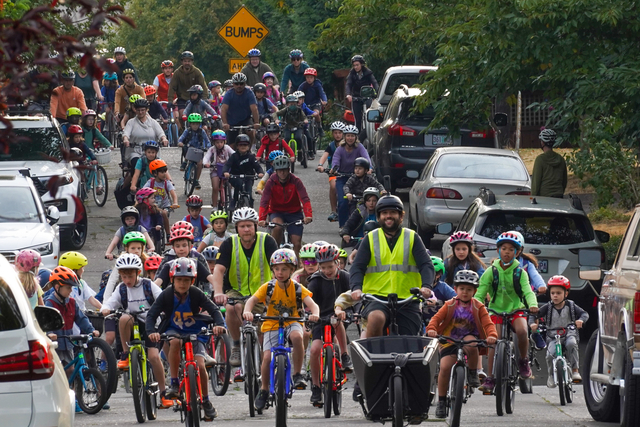Over a few Saturdays in late February and early March conversations buzzed and innovative ideas for Noosa’s transport future were sparked.
The events facilitated by ZEN Inc brought together community members in Noosaville and Cooroy to discuss priorities and strategies to reduce car usage and transport emissions in the Noosa Shire.
Attendees agreed on the importance of active transport solutions and improved public transport systems, aiming to create greater connectivity across the Shire, as well as a more sustainable and eco-friendly future for the region. Advocacy and behaviour change through awareness and demonstration were the key strategies identified.
There was a clear demand for improved walking and cycling paths which include shade trees and safely separated bicycle, walking and car lanes. Raised kerbs or barriers between roads and bike paths increase both riders’ safety and confidence. Demonstration ‘pop-up’ paths, as done in cities around the world, could be a starting point to create excitement about what is possible and help allay safety concerns.
The workshops also identified that safety is better ensured if we can manage car speeds and provide safe road crossings. Quick win solutions such as installing the electronic ‘happy face’ signs to indicate high crossing areas and educating the community on road safety were suggested.
To address traffic congestion, attendees proposed better designated park and ride facilities –coupled with paid parking and EV chargers to encourage tourists to use buses to reach popular destinations. A locals’ pass was suggested, allowing residents to access parking spots and prioritising parking for workers to ensure their safety and convenience.
Drawing inspiration from Canberra’s system, the workshop suggested bicycle racks on buses. This would enable cyclists to move safely between population centres. Improved bus routing and expanded train services would also give better connectivity.
Expanding on-demand transport services was another discussion point with the suggestion Noosa join other shires in South-East Queensland that have Translink on-demand buses. Charging a reasonable fee for on-demand services and offering concessions for pensioners and medical visits were proposed to fund the service and ensure its sustainability.
Behaviour change was discussed at length. Participants were keen to set up an interactive online portal for sharing ideas from other towns and cities, as well as identifying what is working and what needs improvement here in Noosa.
A demonstration project could, for instance, initially engage with one school community to promote walking or cycling school buses, and safe and shady paths. As one former teacher explained: “Build it and they will come! If you have a safe, shady success story in one school that shows it can be done others will be inspired. Only then can you expect the culture to change.”
Another popular suggestion was for Noosa Council and the community to adopt the United Nations’ World Car Free Day on 22nd September each year. This initiative could focus awareness raising activities, promote walking and cycling, reduce road congestion, and showcase people’s personal stories.
Funding reallocation was also a hot topic. Charging tourists for parking in certain areas or introducing a congestion tax were both suggested, with the revenue used by Council to develop active transport infrastructure. This approach aims to balance the impact of tourism with sustainable transport goals.
The workshop concluded with a call for dynamic leadership from the Council and community organisations. Participants stressed the importance of advocacy in driving change, drawing inspiration from national and global successful stories like those in Paris.
If you would like to join with ZEN to take forward these ideas contact us on info@zeroemissionsnoosa.com.







